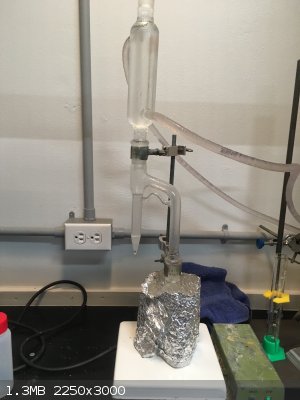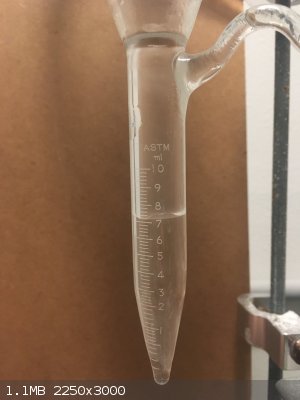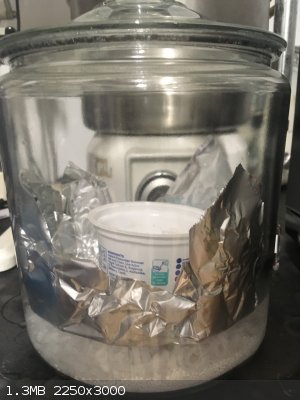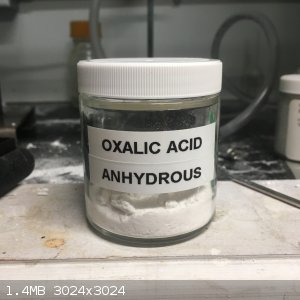Texium
Administrator
       
Posts: 4626
Registered: 11-1-2014
Location: Salt Lake City
Member Is Offline
Mood: PhD candidate!
|
|
Azeotropic dehydration of oxalic acid with toluene
Although this procedure is evidently frequently used, and very straightforward, I noticed that there doesn't seem to be a formal write-up of it on
here, so I decided to make one.
Introduction
Oxalic acid dihydrate is converted to anhydrous oxalic acid by refluxing with toluene using a Dean-Stark trap. Toluene and water form a low boiling
azeotrope, but form separate layers on condensation, allowing for the removal of water from the mixture.
Materials
35 g oxalic acid dihydrate
100 mL toluene
Procedure
100 mL of toluene was added to a 500 mL round-bottom flask with a stir bar.
35 g of oxalic acid dihydrate was added to the toluene with vigorous stirring.
A dean stark trap and reflux condenser (cooled with ice water) was attached to the flask, and the mixture was heated to reflux.1

Reflux was continued until water ceased collecting in the Dean-Stark trap. A total of 9.2 mL of a theoretical 10.0 mL was collected.2

The flask was allowed to cool to room temperature, and the solids were collected by vacuum filtration.
The product was placed in a desiccator over shredded paraffin wax and anhydrous calcium chloride for 24 hours to remove traces of toluene.

Results and Discussion
The yield of anhydrous oxalic acid was 24.28 g, or 97%, though it may not be entirely anhydrous. To determine the exact water content of the product,
a titration with standardized potassium permanganate will be performed and posted here as a followup.

1. The dihydrate was observed to dissolve in its own water of crystallization and form a lower layer in the boiling flask. As more water was captured
in the Dean-Stark trap, the anhydrous oxalic acid began to precipitate.
2. It is not clear whether the unaccounted for 0.8 mL of water remains in the product, or if it can be attributed to condensation on the reflux
condenser that was not collected in the trap. Followup titrations will be conducted to help determine this.
[Edited on 6-7-2018 by Texium (zts16)]
|
|
|
symboom
International Hazard
    
Posts: 1143
Registered: 11-11-2010
Location: Wrongplanet
Member Is Offline
Mood: Doing science while it is still legal since 2010
|
|
Looks great i thought i was reading it in prepublication
|
|
|
clearly_not_atara
International Hazard
    
Posts: 2801
Registered: 3-11-2013
Member Is Offline
Mood: Big
|
|
It would be interesting to try the controversial dimethyl oxalate procedure with anhydrous oxalic acid. byok3y reported that it fails with the
dihydrate, but, if the intermolecular forces that form the dihydrate would also bind methanol to oxalic acid in the absence of water, it might be
possible to form an ester from anhydrous oxalic acid. See here for the failure with the dihydrate:
https://www.sciencemadness.org/whisper/viewthread.php?tid=11...
|
|
|
j_sum1
Administrator
       
Posts: 6338
Registered: 4-10-2014
Location: At home
Member Is Offline
Mood: Most of the ducks are in a row
|
|
One thing you have not accounted for Texium is the water that is usually present in the toluene.
Or did you dehydrate the toluene first?
Anyway, I agree, this probably belongs in prepub. As well as in the wiki. We should be writing up more of these straightforward procedures so they
can be accessible to those who need to know. I, for one would probably have forgotten the shredded paraffin and so looking this up first would have
saved me some time and effort.
|
|
|
walruslover69
Hazard to Others
  
Posts: 235
Registered: 21-12-2017
Member Is Offline
Mood: No Mood
|
|
The amount of water dissolved in the toluene is fairly inconsequential. with 100ml the dissolved water would only be around 50mg. The idea of having
0.5-0.8ml of water that is condensed but stuck to the sides of the glass doesn't sound too far out there.
|
|
|
Boffis
International Hazard
    
Posts: 1886
Registered: 1-5-2011
Member Is Offline
Mood: No Mood
|
|
Excellant bit of work and nice write-up Texium.
I have often wondered whether you could use toluene, the traditional method uses carbon tetrachloride but this is rather difficult to get these days
so its nice to see that you can use something rather more accessible.
|
|
|
AvBaeyer
National Hazard
   
Posts: 654
Registered: 25-2-2014
Location: CA
Member Is Offline
Mood: No Mood
|
|
I have dehydrated oxalic acid by simply heating a sample in dish in a 110C oil bath with occasional stirring until the required weight was lost. The
weight loss happens quite quickly. This dried material was then converted nearly quantitatively to the crystalline dimethyl ester.
AvB
|
|
|
Texium
Administrator
       
Posts: 4626
Registered: 11-1-2014
Location: Salt Lake City
Member Is Offline
Mood: PhD candidate!
|
|
Just updated the OP with several pictures from the other day. Quote: Originally posted by AvBaeyer  | | I have dehydrated oxalic acid by simply heating a sample in dish in a 110C oil bath with occasional stirring until the required weight was lost. The
weight loss happens quite quickly. This dried material was then converted nearly quantitatively to the crystalline dimethyl ester.
|
Interesting. I tried a similar method a while back, except using a toaster oven set to 110ºC, and had major
issues with the product subliming, which left white powder all over the inside of the oven, and produced choking, irritating fumes of oxalic acid.
This method reduces the amount of sublimation since the toluene/water azeotrope boils at 84ºC, and, as I observed, the oxalic acid dihydrate will
melt under the weight of the toluene layer instead of subliming off, similarly to melting iodine under sulfuric acid.
The Orgsyn procedure that uses carbon tet said that using toluene led to issues with sublimation, but I did not find this to be the case. Perhaps they
didn't use enough toluene. They didn't state what their procedure was when they attempted it. My reasoning for using the amounts that I did was that
35 grams of oxalic acid dihydrate should yield exactly 10 mL of water, which is the volume of my Dean-Stark trap. 100 mL of toluene is a nice round
amount that covers the solid generously and facilitates removal of the water since the azeotrope is 80% toluene.
|
|
|
kmno4
International Hazard
    
Posts: 1504
Registered: 1-6-2005
Location: Silly, stupid country
Member Is Offline
Mood: No Mood
|
|
..... azeotropic dehydration of oxalic acid, again and again.
And again I have to say that this dihydrate dehydrates below 100 C.
Few weeks ago i had to prepare a sample of oxallic acid and, as usually, I used SS pots and boiling (very gently) water bath.
Yield was as in my prep. chem. book: 45g of anh. acid from 63g of its dihydrate.
Some sublimation takes place, heating was stopped when weight of the pot with acid does not change. When the pot is covered with cold (r.t.) lid, no
water mist should condense on its surface.
Слава Україні !
Героям слава !
|
|
|